Today’s text is about the relationship between goodness and sin, misfortune and blessing. It’s not really about the healing of the blind man, as much as the text focuses on the reaction to his sight and how God is at work within the man’s blindness.
The man is identified not by a name, but by both his suffering, and his community – his village and family. And yet ironically, they don’t seem to really know him, or about him. Jesus is known as the man called Jesus” (11), a “prophet” (17), “from God” (33) and “Lord, one to be worshipped” (38). Like the woman at the well, he is transformed through his experience of and with Jesus.
The text plays with a contrast of seeing and hearing. The former is part of his new life, while the later is part of his old. And yet it’s with both senses, both his new and old life, that he. alone of everyone in the story, recognizes Jesus. Jesus implies that the whole thing is about God’s blessing not a curse, for it’s through this painful situation that God’s power is made known. Jesus doesn’t try to explain away his suffering, or to tell the man that his blindness is a blessing. Rather he actively seeks to include, and bring this man, into the realm of God’s blessing and love. He never once explains, or justifies, this man’s misfortunes and suffering in terms of sin, or as a consequence of it. There is no explanation of why this suffering happened, (why evil exists in the world), but merely a proclamation and experience of God bringing all beings into blessing and wholeness.
Questions for reflection:
1. What word, phrase or image strikes you in this story?
2. How do we justify not helping our neighbors?
3. In what ways do we “explain” poverty, isolation, addiction simply as “their” problem and not our responsibility?
4. How is this story connected to your story, our story, the unfolding story of God in the world?
Providence is the articulation of the hope that God works in, around an even through those things that oppose God, in order to accomplish God’s will and purposes.
The Pharisees force God into their theological box of faithfulness and sinfulness.
How often do we force people into our theological boxes? Do we promote a creative theology or a static theology? How? What do we convey in worship? Prayer? Song? Look?
Is worship about Orthodoxy [believing the right things], Orthopraxis [doing the right thing] or about simply showing up and being part of the community?

